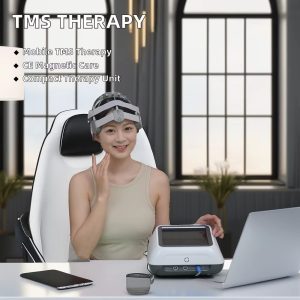In the ever-evolving landscape of medical technology, TMS treatment equipment has emerged as a revolutionary approach with the potential to transform the treatment of various neurological and psychiatric conditions. This non-invasive technique is making waves in the medical community, offering new hope to patients who have not responded well to traditional treatments.
How Does TMS Work?
TMS treatment equipment, such as those offered by QIJIA, operates on a fascinating principle. It uses magnetic fields to stimulate nerve cells in the brain. When the TMS device is placed near the scalp, it generates a magnetic field that can penetrate the skull and reach the underlying brain tissue. This magnetic field then induces an electric current in the targeted neural areas. By precisely controlling the intensity, frequency, and duration of these magnetic pulses, doctors can either stimulate or inhibit the activity of specific brain regions. For example, in treating depression, the TMS device can be used to increase the activity in areas of the brain that are known to be underactive in depressive patients.
Core Technologies Behind TMS
Repetitive RTMS treatment equipment, a subset of TMS technology, takes this a step further. It delivers a series of magnetic pulses at a specific frequency. High-frequency rTMS (above 5 Hz) is generally used to increase neural activity, while low-frequency rTMS (below 1 Hz) can be used to decrease it. QIJIA’s TMS devices incorporate advanced cooling systems. This is crucial because the generation of magnetic fields can produce heat. Their intelligent liquid-cooling circulation system, a patent-protected technology, ensures that the non-heating coil can work continuously for 24 hours. This not only guarantees the safety of the device but also extends its service life.
Treatable Conditions
TMS has shown great promise in treating a wide range of conditions. One of the most well-studied applications is in the treatment of major depressive disorder. Many patients who have failed to respond to antidepressant medications have found relief through TMS therapy. It is also being explored for the treatment of anxiety disorders, obsessive-compulsive disorder (OCD), and even some neurodegenerative diseases like Parkinson’s disease. In the case of OCD, TMS can help regulate the abnormal neural circuits in the brain that are associated with the disorder.

Ideal User Groups
The use of TMS is generally suitable for adults. For example, patients over the age of 18 who are suffering from treatment-resistant depression are prime candidates for TMS therapy. It is also a viable option for those who may not tolerate the side effects of traditional medications well. However, as with any medical treatment, a thorough consultation with a healthcare provider is necessary to determine if TMS is the right choice.
The Benefits of Weak Magnetic TMS
Weak magnetic TMS offers several advantages. Firstly, it is non-invasive, which means there is no need for surgery or the insertion of electrodes into the brain. This significantly reduces the risks associated with more invasive procedures. Secondly, it has fewer side effects compared to many medications. Some patients may experience mild discomfort or a headache during the treatment, but these are usually short-lived. Additionally, weak magnetic TMS can be tailored to an individual’s specific needs. The parameters of the magnetic stimulation can be adjusted based on the patient’s condition and response to treatment.
Considerations for Bulk Orders
If you are a healthcare provider or a medical facility looking to invest in TMS device bulk order discounts, QIJIA offers attractive options. Buying in bulk not only ensures that you have a sufficient supply of these advanced devices but also allows you to save on costs. This can be particularly beneficial if you plan to expand your TMS treatment services or if you are part of a large-scale research project.
Conclusion
In conclusion, TMS treatment equipment, especially those with advanced features like rTMS and efficient cooling systems, holds great potential in the field of medicine. Whether it’s treating mental health disorders or exploring new frontiers in neuroscience, TMS is a technology that is worth watching and considering for those in need of effective and non-invasive treatment options.
Contact Information:
-
WhatsApp: +44 7410558633
-
Email: [email protected] / [email protected]
Raised in Bristol, now backpacking through Southeast Asia with a solar-charged Chromebook. Miles once coded banking apps, but a poetry slam in Hanoi convinced him to write instead. His posts span ethical hacking, bamboo architecture, and street-food anthropology. He records ambient rainforest sounds for lo-fi playlists between deadlines.